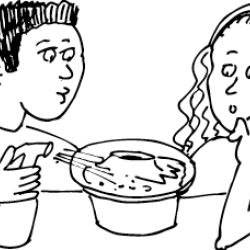Source Institutions
Source Institutions
Add to list Go to activity
Activity link broken? See if it's at the internet archive

In this activity (on pages 12-15), learners make a crater model and test the effects of weather (rain) on its surface. This activity helps learners understand how Earth's crust is constantly bombarded by weather which reshapes Earth's surface, erasing signs of craters that were originally made by rocky asteroids landing on Earth's surface.
- 30 to 45 minutes
- 30 to 45 minutes
- $1 - $5 per group of students
- Ages 8 - 14
- Activity, Model, Simulation
- English, Spanish
Quick Guide
Materials List (per group of students)
- small bowl (use disposable for easy cleanup or to save model)
- powdered sugar (about 100 ml, or enough to fill bowl 4 cm deep)
- cocoa powder in a shaker (about 10 ml or 1 tablespoon per crater)
- a small stone (to simulate a rocky asteroid)
- spray bottle filled with water
- newspaper to cover the table
- metric tape measure
Subjects
-
Earth and Space Science
-
Earth Processes
- Weather and Climate
-
Earth Structure
- Rocks and Minerals
-
Earth's History
- Geologic Time
-
Solar System
- The Planets
-
Earth Processes
Informal Categories
- Model Building
Audience
To use this activity, learners need to:
- see
- touch
Learning styles supported:
- Involves teamwork and communication skills
- Involves hands-on or lab activities
Designed specifically for
- Rural dweller
Culture, ethnicity, and gender
-
Girls
- Explicity developed for this group
Other
Foreign language versions of this resource:
Components that are part of this resource:
Includes alignment to state and/or national standards:
This resource is part of:
Access Rights:
- Free access
By:
Source Collection
- Science After School Consumer's Guide
Rights:
- All rights reserved, University of Nebraska State Museum and Nebraska 4-H, 2002
Funding Sources:
- National Science Foundation Informal Science Education Program, 9909496
- Howard Hughes Medical Institute
